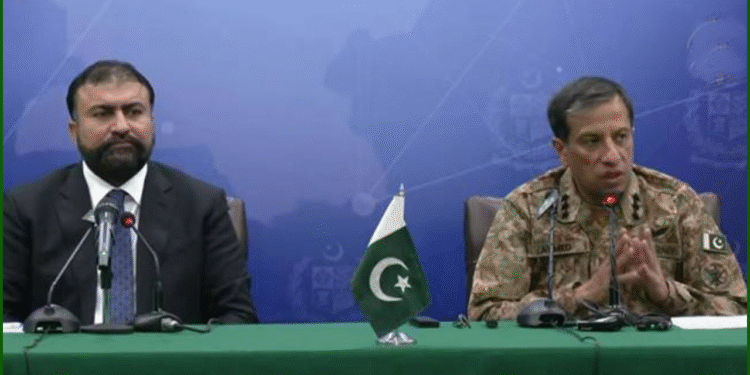Islamabad, May 23, 2025 – Pakistani authorities have strongly condemned a devastating terrorist attack on a school bus in Khuzdar, Balochistan, which claimed the lives of eight individuals, including six children. In a joint press conference held in Islamabad, senior civil and military officials pointed to India as the orchestrator of the attack, accusing it of waging a proxy war to destabilize Pakistan.
Interior Secretary Captain (Retd) Khurram Muhammad Agha and Director General of Inter-Services Public Relations (DG ISPR) Lt Gen Ahmed Sharif Chaudhry described the attack as a heinous act targeting innocent lives and Pakistan’s core values. “This was not merely an attack on a school bus but an assault on the very fabric of our society,” Agha stated, vowing a resolute response to the perpetrators.
Allegations of Indian Involvement
The officials alleged that the attack was carried out by a group they referred to as “Fitna al-Hindustan,” a term used to describe India-backed terrorist elements. According to Lt Gen Chaudhry, Pakistan has long-standing evidence of India’s role in sponsoring terrorism in Balochistan, dating back to dossiers submitted to the United Nations in 2009 and 2016. These documents, he claimed, detailed India’s financial and logistical support for terrorist activities in the region.
Chaudhry presented an audio recording allegedly featuring an Indian army officer, identified as Major Sandeep, discussing the funding of terrorist operations in Balochistan. The recording, according to the DG ISPR, exposed India’s use of separate accounts to channel money for various stages of terror activities. “This is a calculated strategy to sow chaos in Pakistan,” he said, accusing India of targeting vulnerable groups, including women and children, after failing to achieve its objectives against harder targets.
A Pattern of Violence
The Khuzdar attack is part of a broader series of violent incidents in Balochistan, which Pakistani officials attribute to India’s proxy war. Lt Gen Chaudhry cited several recent attacks, including the killing of 12 laborers in Nushki on April 12, two civilians in Tump Kech on April 28, and an IED blast in Harnai on February 14 that claimed 10 lives. He also referenced the targeting of off-duty personnel and civilians in incidents such as the Jaffer Express attack and the killing of three people in Lasbela on May 9.
“These are not random acts. They are orchestrated by India to undermine Pakistan’s stability,” Chaudhry said, emphasizing that the attackers lack any connection to Baloch or Pakistani identity and are driven solely by foreign agendas.
Evidence and International Response
During the press conference, officials displayed images of terrorists killed by Pakistani security forces, showcasing sophisticated weaponry, including sniper rifles and night-vision equipment, allegedly supplied by India. Chaudhry questioned how such advanced arms reached the hands of terrorists, pointing to India as the primary financier.
The DG ISPR also criticized Indian media for its rapid and celebratory coverage of attacks in Pakistan, including an October 6, 2024, incident targeting Chinese nationals in Balochistan. He accused Indian outlets of falsely portraying Pakistan as a hub of terrorism while ignoring their own country’s role in regional instability.
The United Nations Security Council has condemned the Khuzdar attack, calling for accountability and justice for the victims. Pakistani officials urged the international community to scrutinize India’s actions and hold it accountable for its alleged sponsorship of terrorism.
Pakistan’s Response and Resilience
Lt Gen Chaudhry highlighted Pakistan’s ongoing efforts to combat terrorism, noting that security forces have eliminated over 200 terrorists in Balochistan in 2025 alone, following nearly 250 in the previous year. He also pointed to the closure of illegal trade routes used to fund terrorist activities and the strong support from local communities in countering extremism.
Despite the violence, Pakistan remains committed to development in Balochistan, with projects such as the Gwadar International Airport, road infrastructure, hospitals, and technical institutes driving economic growth. Over 73,000 Baloch students are currently benefiting from educational scholarships, a testament to the province’s progress, according to Chaudhry.
A Call for Regional Peace
The DG ISPR underscored that India’s actions are not only a threat to Pakistan but to regional peace as a whole. He reiterated Pakistan’s stance on the Kashmir dispute as a central issue for stability in South Asia and vowed to protect the country’s water rights under the Indus Waters Treaty.
“Pakistan will not be coerced by force or threats,” Chaudhry declared, echoing sentiments from a recent corps commanders’ conference led by Army Chief Field Marshal Syed Asim Munir. The military leadership reaffirmed its commitment to safeguarding Pakistan’s sovereignty and territorial integrity against any aggression.
As investigations into the Khuzdar attack continue, Pakistani authorities have promised a decisive response to those responsible, signaling their determination to counter India’s alleged proxy war and protect the nation’s future.

















































